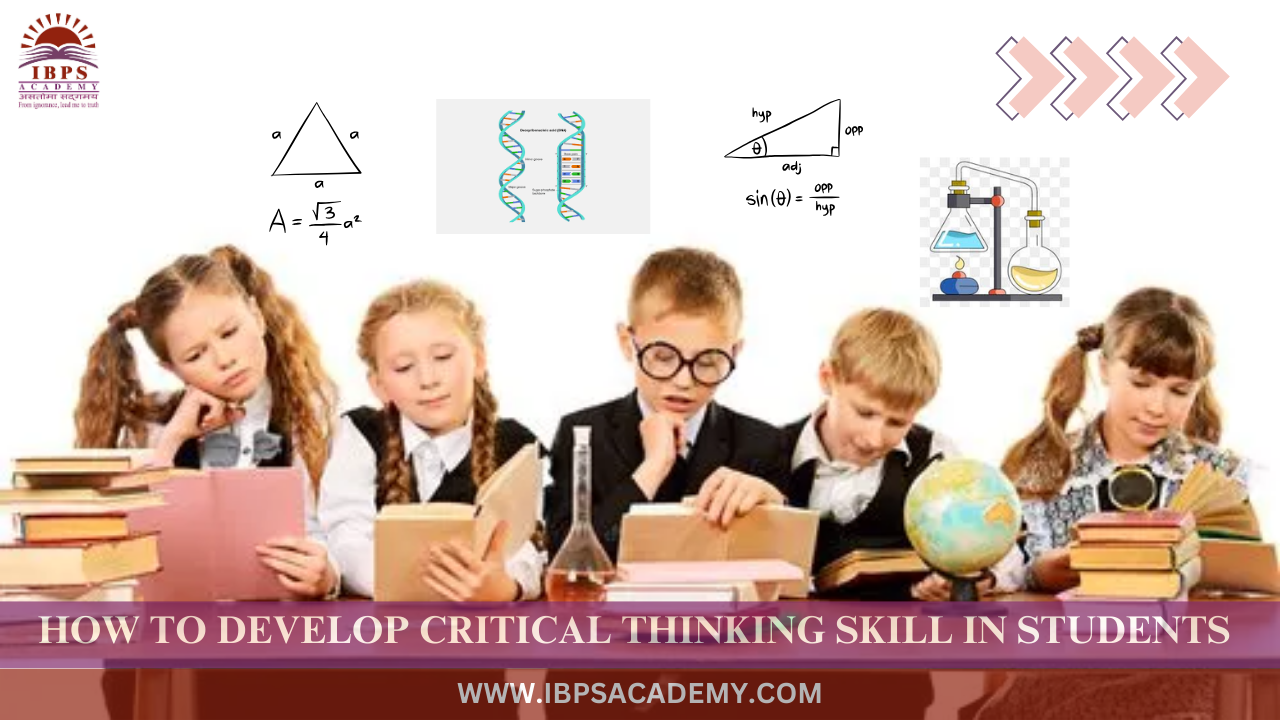HOW TO DEVELOP CRITICAL THINKING SKILL IN STUDENTS
Published on: Dec 21, 2024
HOW TO DEVELOP CRITICAL THINKING SKILL IN STUDENTS
Building critical thinking skills is an ongoing process that involves cultivating a mindset of curiosity, open-mindedness, and logical reasoning. Here are some practical strategies to help develop and strengthen these skills:
1. Ask Questions
- Challenge assumptions: Don't accept things at face value. Always ask questions like, "Why is this true?", "What evidence supports this?", and "Are there alternative explanations?"
- Dig deeper: Instead of simply accepting answers, try to explore the underlying reasons and factors involved.
2. Analyze Information
- Evaluate sources: Assess the reliability and credibility of the information you come across. Is the source trustworthy? Is the data supported by evidence?
- Look for biases: Be mindful of biases in both the information you're receiving and your own thinking. Bias can cloud judgment and affect the objectivity of your analysis.
3. Consider Different Perspectives
- Empathy and open-mindedness: Try to understand issues from multiple viewpoints. This will help you see the complexity of situations and prevent jumping to conclusions.
- Debate respectfully: Engage in discussions with others who have differing opinions. This can sharpen your ability to see the strengths and weaknesses in different arguments.
4. Break Problems Into Smaller Parts
- Decompose issues: For complex problems, break them down into manageable pieces. Identify key components and assess each one separately to understand the whole problem more clearly.
- Think sequentially: Focus on the logical progression of ideas and how each part of a problem relates to another.
5. Develop Logical Reasoning
- Practice logic puzzles: Solve puzzles, games, and exercises that require logical reasoning (like Sudoku, chess, or brain teasers).
- Learn logical fallacies: Understand common reasoning errors like false dilemmas, straw man arguments, and ad hominem attacks, so you can avoid them and spot them in others' arguments.
6. Use Evidence and Data
- Support conclusions with evidence: Good critical thinkers base their opinions on facts and evidence, not just emotions or beliefs. When you form conclusions, ask yourself what data supports them.
- Make data-driven decisions: Whether you're making a simple decision or a more complex one, use available data to inform your conclusions.
7. Practice Reflective Thinking
- Self-reflection: After making decisions or evaluating information, reflect on your thought process. What could you have done differently? Did you miss something important?
- Learn from mistakes: Recognize and learn from your errors. Reflect on how they happened and what you can do differently in the future to improve your judgment.
8. Stay Curious and Keep Learning
- Read widely: Expose yourself to different topics, perspectives, and sources of information. The more you know, the more tools you'll have to analyze situations critically.
- Be a lifelong learner: Constantly update your knowledge base and refine your thinking. Keep asking questions and seek to improve your understanding of the world.
9. Apply the Socratic Method
- Engage in Socratic questioning: Use this technique to explore ideas by asking and answering questions to stimulate critical thinking and illuminate ideas. It involves probing assumptions and asking for clarification.
10. Practice Problem-Solving
- Tackle challenges: Seek out problems that require critical thinking and work on solving them. The more you practice, the better you'll become at approaching problems with a clear, logical, and systematic mindset.
11. Limit Emotional Bias
- Recognize emotional influence: Critical thinking involves separating emotional responses from logical analysis. Work on controlling emotions and not allowing them to override reasoned thinking.
- Stay objective: Try to base conclusions on facts and logic, rather than being swayed by feelings or preconceptions.
CONCLUSION
By consistently applying these strategies, you can significantly enhance your critical thinking skills and become better at solving problems, making decisions, and engaging with complex issues.


